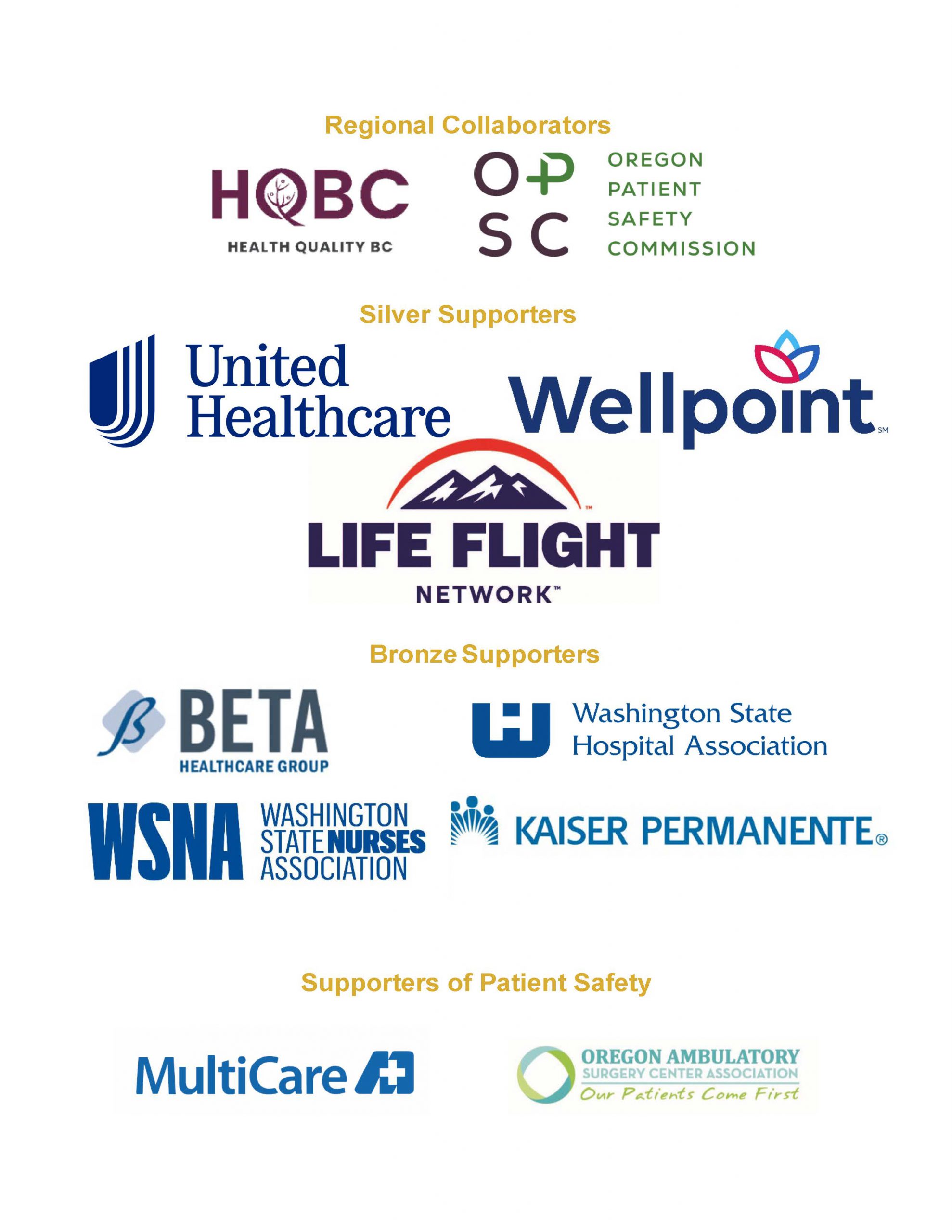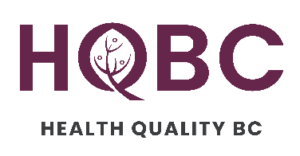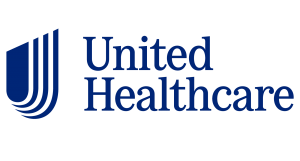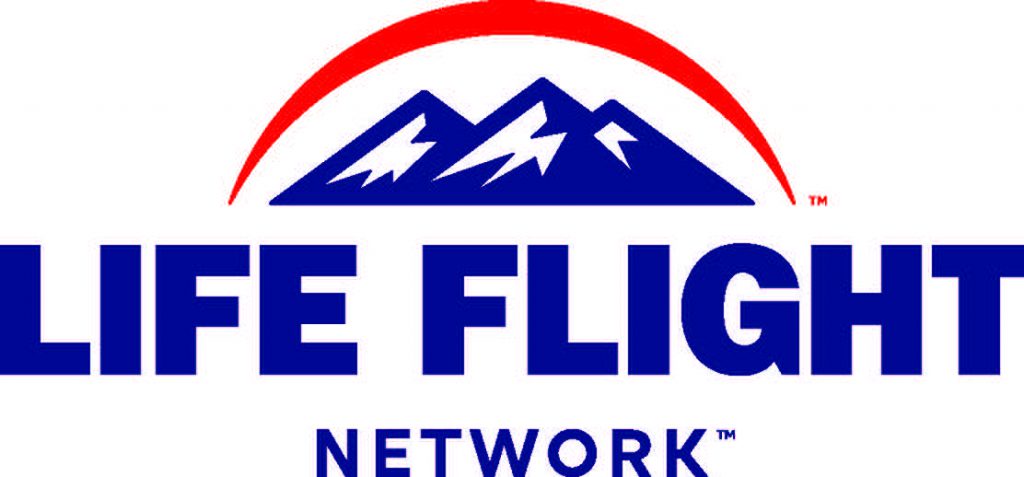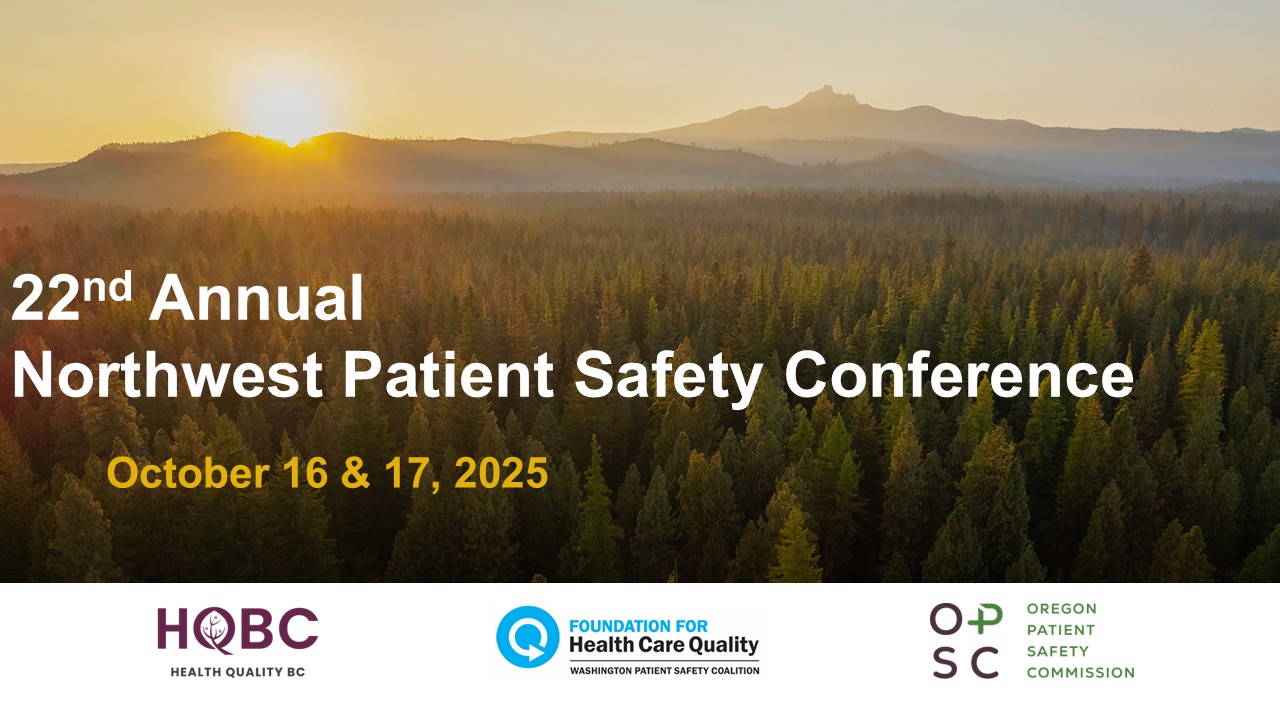
The 22nd Northwest Patient Safety Conference
Recorded Presentations are Available
“Navigating Rough Seas”
October 16th and 17th, 2025
Presented in collaboration with the Oregon Patient Safety Commission and Health Quality B.C.
HOW TO VIEW THE RECORDED PRESENTATIONS
The conference presentations are posted on the conference event portal. If you registered for the live conference, all presentations, and supporting materials, are available for you to view. To view the recorded presentations, log into the event portal just as you did for the live event using the link found in your registration confirmation and enter your attendee confirmation code (you can find your code at the bottom of your registration confirmation email or click HERE to have it resent to your email. If you encounter any issues accessing the portal, please contact Amelina Kassa for assistance.) Once you are logged into the portal, click on the “Info” tab at the top of the page (most left tab). The presentations, slides, and supporting materials will all be posted below on the page sorted by presentation date and time.
HOW TO REGISTER FOR THE CONFERENCE TO WATCH THE RECORDED PRESENTATIONS
The presentations are recorded and available until October 1, 2026 for everyone registered.
Didn’t get to attend the live event? No worries, we’ve got you covered! To register, please contact Amelina Kassa at akassa@qualityhealth.org. Amelina will get you registered.
HOW TO APPLY FOR CE CREDITS IF YOU VIEW THE RECORDED PRESENTATIONS:
Log in to the conference portal HERE as you did for the live conference to access all recorded presentations. You will need your attendee code. If you cannot locate your attendee code, click HERE and enter your email address to have it resent to you.
Once logged in, navigate to the first tab, “Info,” to view presentations, slides, and supporting materials organized by presentation date and time. Instructions for applying for CE credits are on the “Info” page after you log in.
Important: If you request Nursing Contact Hours, a separate follow-up conference evaluation is required by the California Board of Registered Nursing. A link is located on the Info Tab.
Here’s a tip: if you watched the live presentations and received a CE certificate with partial credits, please review the presentations on your certificate so you don’t repeat any. Additional CEs will be awarded for the recorded presentations you view.
The conference is accredited for 14 credit hours for BCPA, CPHQ, CPHRM, CPPS. 16.9 Nursing Contact Hours.
The 2025 Northwest Patient Safety Conference is approved for 9 General, 1 Ethics and 4 J.E.D.I. CEs by the Patient Advocate Certification Board to satisfy the requirements for Board Certified Patient Advocates (BCPA) approval code 18531.
This meeting has been approved for a total of 14.0 contact hours of Continuing Education Credit toward fulfillment of the requirements of ASHRM designations of FASHRM (Fellow) and DFASHRM (Distinguished Fellow) and towards CPHRM renewal.
This activity/program is approved by NAHQ® for 14.0 CPHQ CE credits.
This activity meets the criteria of the Certification Board for Professionals in Patient Safety for up to 14.0 CPPS CE hours.
Approved by the California Board of Registered Nursing, Provider Number CEP 16359 for 16.8 contact hours.
ABOUT THE CONFERENCE
The live conference was held October 16th– 17th, 2025
The theme is “Navigating Rough Seas.” Currently, our health care environment is turbulent and unpredictable. This year’s conference provides insight and actionable tools and techniques to help us address the challenging and unique time we are in.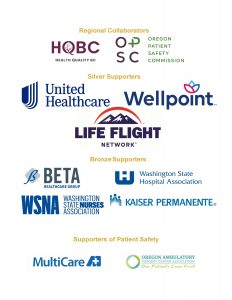
Why is the Northwest Patient Safety Conference popular?
- It’s the program. We field interesting and applicable topics presented by inspiring and thought-provoking faculty.
- It’s accessible to everyone, regardless of where you live or work. It’s live through a virtual format so you don’t have to drive or fly for hours. Have a scheduling conflict? No problem, the live presentations are recorded so you can watch what you missed.
- It’s a value. There aren’t many conferences where you can get 14 hours of content for under $100 US. If you’re a patient or health care student, it’s free.
Check out the presentations on the Presentation Tab. Here is a sample of the presentation topics.
About the Northwest Patient Safety Conference
Now in its 22nd year, the Northwest Patient Safety Conference is the only event of its kind in the Western US, uniting healthcare professionals, providers, patients, families, and caregivers from all care settings for networking and engaging in sessions with industry thought leaders invested in improving the patient experience. It is a collaboration between the Washington Patient Safety Coalition, the Oregon Patient Safety Commission, and Health Quality B.C.
Members of the conference committee who are putting on this fantastic conference
Andrew Wray Jeff Goldenberg
Amelina Kassa Jonathan Stewart
Anita Sulaiman Naomi Kirtner
David Birnbaum Rex Johnson
Dallas Smith Sydney Edlund
Farinaz Havaei Valerie Harmon
Jamie Leviton Yanling Yu
About the Washington Patient Safety Coalition
The Washington Patient Safety Coalition brings together a diverse group of participants to focus on achieving common patient safety goals. Our mission is to improve safety for patients receiving health care in Washington, in all care settings, with a vision of safe care for every patient, every time, everywhere. The WPSC is a program of the Foundation for Health Care Quality, a nonprofit organization dedicated to providing a trusted, independent, third-party resource to all participants in the health care community – including patients, providers, payers, employers, government agencies, and public health professionals.
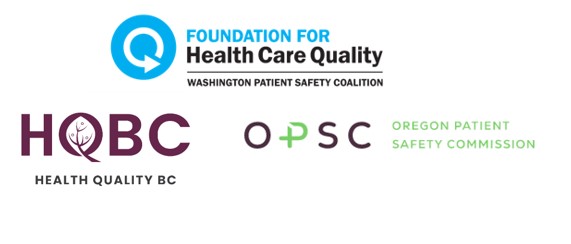
REGISTRATION FOR THE RECORDED PRESENTATIONS IS OPEN!
HOW TO REGISTER FOR THE CONFERENCE TO WATCH THE RECORDED PRESENTATIONS
The presentations are recorded and available until October 1, 2026 for everyone registered.
To register, please contact Amelina Kassa at akassa@qualityhealth.org. Amelina will get you registered.
The Northwest Patient Safety Conference is presented in collaboration with the Oregon Patient Safety Commission and Health Quality BC.
Total presentations: 14
Fees:
CE credits apply to recorded presentations.
- Healthcare professionals and anyone seeking continuing educational credits, $85 US
- Patients, their families, and healthcare profession students attend free
- Discounts are offered for registrants with CPHQ, CPPS, CPHRM, and BCPA professional certifications.
Payments accepted: all major credit cards via PayPal.
Continuing educational credits: Attendees are eligible for Nursing contact hours, CPHQ, CPHRM, CPPS and BCPA educational credits. These may be acquired by watching the recorded sessions up to October 1, 2026.
Attendees will request CE credits via a form on the recorded conference website.
| Credit Type | Total Credits for Conference | Credits Available for Recordings |
| BCPA |
14 total 4 JEDI The 2025 Northwest Patient Safety Conference is approved for 9 General, 1 Ethics and 4 J.E.D.I. CEs by the Patient Advocate Certification Board to satisfy the requirements for Board Certified Patient Advocates (BCPA) approval code 18531. |
Yes – up to the 4 JEDI, 1 Ethics and the 9 General. 14 Total |
| Nursing Contact Hours |
16.8 total available Approved by the California Board of Registered Nursing, Provider Number CEP 16359 for 16.8 contact hours |
Yes, up to the 16.8 total |
| CPHRM |
14 total This meeting has been approved for a total of 14.0 contact hours of Continuing Education Credit toward fulfillment of the requirements of ASHRM designations of FASHRM (Fellow) and DFASHRM (Distinguished Fellow) and towards CPHRM renewal. |
Yes, up to the 14 total |
| CPHQ | 14 total This activity/program is approved by NAHQ® for 14 CPHQ CE credits |
Yes, up to the 14 total |
| CPPS | 14 total This activity meets the criteria of the Certification Board for Professionals in Patient Safety for up to 14.0 CPPS CE hours. |
Yes, up to the 14 total |
A framework for involving patient and family partners in patient safety event reviews - Kathryn Proudfoot, Felicia Laing, Mary MacKillop
What happens when patients and families are invited as full members of patient safety event review committees—including those protected under Section 51? At Provincial Health Service Authority in B.C. (PHSA), we’re piloting a new approach that aims to move beyond consultation toward genuine partnership in safety learning and improvement.
This session will introduce PHSA’s framework for supporting the safe and effective inclusion of patient and family partners (PFPs) in safety event reviews. Designed to meet programs where they are, the framework provides tools, guiding principles, and a phased implementation approach that honours organizational readiness, cultural safety, and legal context.
Learning Objectives:
1) Explore how meaningful patient and family partner (PFP) involvement in patient safety event reviews can transform learning, uncover root causes, and drive system-wide safety improvements.
2) Learn how PHSA’s new framework and phased implementation approach support safe, effective, and context-sensitive inclusion of PFPs across programs—regardless of current organizational readiness.
3) Understand how involving PFPs in Section 51*-protected reviews strengthens person-centred partnerships, supports accreditation readiness, and reflects diverse perspectives in safety culture.
* BC’s quality assurance legislation falls under the Ministry of Attorney General’s Evidence Act
[RSBC1996]. Section 51 of the Evidence Act (Section 51); was developed to
promote quality assurance or quality improvement by supporting an environment where health
care providers could speak truthfully about the care they or others provided, without fear that
the information produced during a review could be used as evidence in a legal proceeding.
The legislation articulates a qualifying committee structure and sets out that information
provided to and produced by a qualifying committee is prohibited from being used in legal
proceedings. The intent is to provide a safe space for frank and open discussion amongst health
care professionals.
Additional resources:
- PHSA Patient and Family Engagement Framework
- Framework for PFP Participation in PSERs
- BC Children’s Hospital
- BC Women’s Hospital + Health Centre
Best practice leaders: leveraging health equity to reduce disparities and improve patient safety and outcomes - Karie Nicholas and Panel
Four healthcare organizations present innovative processes and practices that enhance equity that result in measurable changes in access to, and quality of, care for patients, reductions in patient harm and improved outcomes.
Learning Objectives:
1) Learn innovative practices that address healthcare inequities leading to improved patient safety and outcomes.
2) Understand how different healthcare organizations embed equity principles into best practices.
3) Learn how specific quality improvement activities, that are focused on equity, are implemented in different healthcare environments.
Building the table together: Lessons on authentic community engagement from INSPIRE - Siena Ruggeri
Community engagement is a powerful tool to advance health equity and empower patients. When done well, community engagement builds trust, advances health equity, creates cost-savings and efficiencies for healthcare organizations, and leads to healthy and thriving communities. Unfortunately, too often, well-intentioned community engagement initiatives are limited in diversity, fail to achieve meaningful outcomes, and fall short of authentic power-sharing. INSPIRE (Initiating National Strategies for Partnership, Inclusion, and Real Engagement) is a national partnership project that brings together the Camden Coalition, Community Catalyst, the Center to Advance Consumer Partnership, PFCCpartners, the Institute for Patient-and Family-Centered Care, alongside a team of experts with lived experience. Together we are working to co-design a national strategy to advance meaningful partnerships between healthcare organizations and community members.
Learning Objectives:
1) Understand major finding from INSPIRE’s research efforts engaging over 300 healthcare stakeholders and community members from across the country.
2) Learn practical strategies to more meaningfully engage the patient community.
3) Strengthen their ability to make the “business case” for sustained investment in community engagement.
Further Reading:
A roadmap for effective community engagement in healthcare: Final report from INSPIRE Phase 1
INSPIRE (Initiating National Strategies for Partnership, Inclusion, and Real Engagement) is a collaborative and coordinated team of organizations and people with lived experience committed to advancing the practice of authentic community engagement (CE) in the US healthcare system.
Phase 1 of INSPIRE consisted of a year-long research and strategic planning phase that included collecting feedback from 300 individuals across sectors and the nation. Activities included several listening sessions, targeted literature analysis, key informant interviews, and a field survey.
The resulting report provides a roadmap for how healthcare organizations and people with lived experience can realize the full potential of authentic CE to build trust, advance health equity, create cost-savings and efficiencies, and create healthy and thriving communities. From compensating people with lived experience to creating trauma-informed spaces, learn how you can build stronger connections, get genuine feedback, and advance equity in your community.
Clinical Decision Making: The key activity in clinical medicine - Pat Croskerry
Provides an overview of the key activity in Clinical Medicine – how we make decisions. The talk is centered on how we make clinical decisions in medicine and how they contribute to diagnostic failure, the most serious threat to patient safety. The argument will be made that current Root Cause Analysis (RCA) typically provides limited insight into how clinical decision making fails – an alternative system is proposed that brings into focus the distal causes of failed clinical decision making.
Learning Objectives:
1) To emphasize that along with the acquisition of medical knowledge, it is especially important to consider how we think about that knowledge.
2) To emphasize that the complexity of the diagnostic process requires changes in the way that clinicians think and make decisions.
3) To reinforce that the development of well-calibrated rationality in clinical reasoning and decision making is the most important of a clinician’s skills
Cultural safety IS patient safety: Reporting and responding to indigenous-specific racism and discrimination in healthcare - Andrea Walker
With supportive culture change enablers, and through significant engagement and many plan-do-study-act-cycles, we developed a process to report and review incidents of Indigenous-specific racism and discrimination (ISRD) that have caused patient harm. These events are reported directly from patients and families as their lived experience, or from staff witnessing how racism and discrimination is operating in healthcare and contributing to harm. The focus of this work is to effect system-level change to make improvements in the provision of culturally safe and anti-racist care and use restorative approaches for resolution to rebuild trust with harmed patients, families and communities. This project is aligned with obligations from the Canadian government and related foundational documents (such as the Declaration of the Rights of Indigenous Peoples Act and the Truth and Reconciliation Commission of Canada’s Calls to Action) and with our Integrated Quality and Safety Strategy goal of achieving a culturally safe and anti-racist environment. The work included launching Indigenous self-identification in patient safety event reporting, creation of an avenue for staff to report racism and discrimination as a contributing factor to a safety event, formation of an ISRD incident response committee, the development of an ISRD reporting and review protocol with associated tools, templates and resources, and creation of reporting accountability (tracking incident information, resolution approaches and recommendation implementation). Early findings show increased confidence of leaders in reviewing ISRD and that many events have led to resolution, learning and action.
Learning Objectives:
1) Describe the historical and ongoing impacts settler colonialization has on Indigenous-specific racism and discrimination in healthcare, and explain why addressing these harms is essential to ensuring culturally safe, equitable, and high-quality care.
2) Identify the key enablers of the culture change required to address Indigenous racism and embed cultural safety as a core component of patient safety.
3) Gain practical skills in how to report and review incidents of patient harm resulting from Indigenous-specific racism and discrimination and explain how a structured reporting and review process enables follow-through on recommendations, fosters accountability at individual and system levels, and supports achieving resolution to restore trust with Indigenous patients and families.
Embedding Patient and Family Partner Perspectives within Quality & Safety Initiatives - Shaila Jiwa, Anna Ryan
We will share a brief overview of the new B.C. Provincial Health Service Authority’s (PHSA) Patient Engagement Framework which provides a consistent and adaptable approach to engagement across PHSA. This will be expanded by sharing of two examples, and insights from these examples, related to patient and family engagement within the central Quality and Safety Team that incorporate the approaches and best practices of the framework – 1) Patient and Family Partner Engagement within the PHSA Speak Up for Patient Safety Procedure and 2) Patient and Family Partner Inclusion within the new PHSA Integrated Quality & Safety Steering Committee
Learning Objectives:
1) Describe the components of the PHSA’s Patient Engagement Framework.
2) Explain how the approaches and best practices of the Speak Up for Patient Safety Procedure contribute to improved patient safety and quality.
3) Explain how the new Integrated Quality & Safety Steering Committee has improved patient and family partner inclusion and led to improved safety and quality.
How patient care suffers when money comes first - Tara Bannow
Attendees will learn about how patients were affected after profit-oriented operators took control in various health care settings, including hospitals, nursing homes, physician practices, and even autism therapy providers. We’ll go over specific case studies and research involving publicly-traded hospital chains and private equity firms and discuss how quality, safety, and access can suffer when an operator’s first priority is generating a financial return. This session will also spotlight an example of how Medicare’s financial penalties can influence hospital policies over time — even at nonprofit academic hospitals — in ways that jeopardize patient safety.
Learning Objectives:
- Describe the different types of health care services operators and how their priorities differ.
- Explain the ways patient care can change after profit-driven operators take over and how it happens.
- Describe Medicare’s financial penalties for reporting healthcare-acquired infections and how these influence hospitals’ policies with respect to testing for infections.
Humility and identity as pathways to trust (and Truth) - Dannagal Young
Intellectual humility (a willingness to acknowledge that we might be wrong) is a characteristic and a practice that we see rarely in public life, but research is increasingly suggesting that it may be key to reducing belief in misinformation. It may also facilitate meaningful connections with people who see us as outgroup members, thus opening pathways to future conversations that could promote patient care and positive health outcomes. Especially in a moment when trust in science and medicine is declining, finding ways to engage with patients of various political and social persuasions is necessary to promote public health. This presentation will explore the role of social identity in shaping public misperceptions about health and science, and how intellectual humility might be integrated into patient care in a way that helps to bridge these divides.
Learning Objectives:
1) Understand the concept of intellectual humility, what it is and what it looks like.
2) Understand the link between social and political identity and misperceptions in the realms of science and medicine.
3) Acquire specific methods and techniques to integrate intellectual humility and a shared political identity into patient care.
Implementing diagnostic excellence across systems: An opportunity to improve care - Sangeeta Ahluwalia
RAND is a nonprofit research organization that is leading an AHRQ-funded initiative to enhance diagnostic safety in healthcare and is seeking health care organizations that are interested in implementing one or more resources designed to improve diagnosis-related communication and decision-making: Calibrate Dx: A clinician tool for refining diagnostic reasoning; Measure Dx: A guide for identifying and learning from diagnostic safety events; and Toolkit for Engaging Patients To Improve Diagnostic Safety: Simple interventions to improve exchange of diagnosis-related information in office-based settings. This is a great opportunity for clinics, hospitals, and health systems to be involved in improving diagnostic safety and reducing patient harms at their site.
Learning objectives:
1) Describe the prevalence and impact of diagnostic safety events.
2) Understand the importance and salience of using previously developed resources to improve diagnostic safety in different settings.
3) Identify at least one available resource that could directly improve diagnostic safety at their site.
Nurse Staffing: Lessons from PNW - Gloria Brigham, EdD, MN, RN, CPHRM, WA State Nurses Association; Christy Simila, BSN, RN, CMSRN, HNB-BC HWNC-BC, Oregon Nurses Association
This education session will provide an overview of hospital staffing laws in Washington and Oregon, highlighting key legal requirements and differences between the two states. Participants will explore practical implementation experiences, including common strengths and challenges faced by hospitals and nursing staff. The session will also review recent research findings on staffing and its effects on patient outcomes and workforce well-being, offering evidence-based insights to inform practice and policy.
Learning Objectives:
At the conclusion of this presentation on Washington and Oregon staffing laws, the participant will be able to:
1) Describe two key requirements of the staffing laws in each state.
2) Identify two strengths and two challenges in implementing these laws.
3) Summarize key findings from recent research on patient and workforce outcomes.
Partnering with patients and families to enhance safety - Beverley H. Johnson, Peter Tarsa
Patients and families and partnerships with them are essential to patient safety in all settings where individuals and families receive care and support. Specific examples of patient and family partnerships will be discussed as well key strategies for successful collaboration. The new CMS Patient Safety Structural Measure for many hospitals in the United States will be briefly described.
Learning Objectives:
1) Describe the evolution of patient and family partnerships in quality improvement and safety through a succinct history of patient safety.
2) Discuss specific ways to partner with patient and family advisors to enhance safety and reduce harm.
3) Model partnership with a patient/family leader and describe strategies to support successful participation.
Side Effects May Include: Awe, Rage, and Strategic Clarity - Jessica Halem
LGBTQ people and their families have never been safe in the healthcare system. In fact, doctors and nurses have perpetuated some of the worst injustices many LGBTQ people have ever faced. But over the last 25 years great progress has been made to address this history and the pain faced by this growing patient population. Together, we will learn about the past, celebrate the progress, assess the current challenges, and find a path forward to ensure everyone is safe to receive the care they deserve.
Learning Objectives:
1) Appreciate the history of medical injustice towards LGBTQ patients.
2) Understand the great changes healthcare systems have made to address LGBTQ patient’s unique needs
3) Reflect on ways we can continue to move forward with better care for everyone
Trust is greater than Truth: What happens when we center ourselves not as experts, but as fellow patients, caregivers, and people first? - MK Haber
The public is at greater risk of harm from medical misinformation now more than ever. How can we regain people’s trust and build their skills to navigate the current information landscape?
Learning Objectives:
1) Identify where we are and how we got here.
2) Identify some effective communication strategies.
3) Understand the importance of collaborations for amplification (Every single one of us needs every single one of us.)
Why we still kill patients and what needs to change so we don’t - Michael L. Millenson
It’s been anywhere from three to five decades since high-quality evidence demonstrated the pervasiveness of medical error. While discussion of preventable patient harm has become radically more open, there’s been no corresponding radical decrease in its ubiquity. This presentation takes a hard look at why we still kill patients and what needs to change so we don’t.
Learning Objectives:
1) Learn the medical literature on patient safety that predates the 1999 “To Err is Human” report
2) Understand the real-life barriers that have impeded progress towards safe care
3) Learn strategies for breaking through barriers in order to achieve significant progress towards the goal of zero preventable harm.
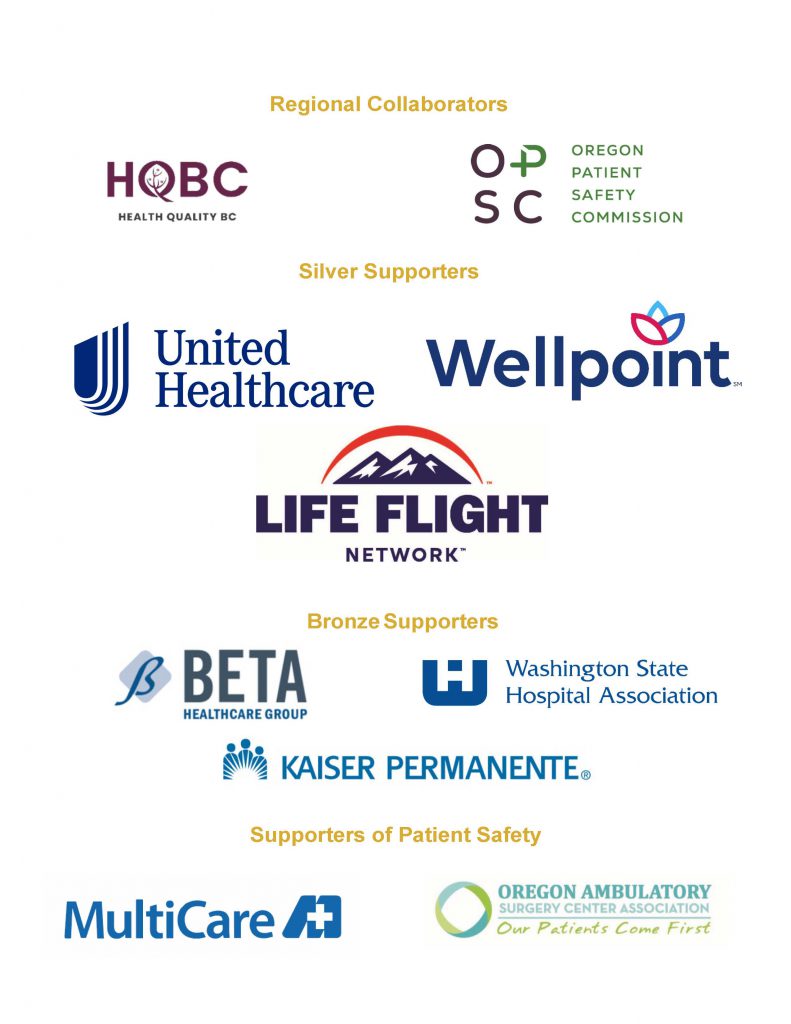
Andrea Walker - Cultural Safety Is Patient Safety: Reporting and Responding to Indigenous-Specific Racism and Discrimination in Healthcare

Andrea Walker
Andrea Walker is the Chief Quality, Patient Safety & Experience Officer for Provincial Health Services Authority, serving healthcare delivery in British Columbia, Canada, on the unceded, ancestorial, and traditional lands of the First Nations Peoples. She leads quality, patient safety and patient experience teams across the health authority, which provides specialized clinical service delivery programs for the Province in Cancer Care, Emergency Health Services, Children’s and Women’s Care, Mental Health & Substance Use Services and the Center for Disease Control. Andrea is a Registered Nurse with Bachelor’s and Master’s degrees in Nursing from the University of British Columbia, and she recently completed the Institute for Healthcare Improvement’s Global Chief Quality Officer Program. She has progressively taken on new leadership roles and responsibilities throughout her career, including clinical education, professional practice, operations and quality and safety. Her most recent initiative focused on the development of an Integrated Quality and Safety Strategy with prioritized projects and an accompanying measurement framework to demonstrate the impact of the work on improving health outcomes, safety culture, and patient experience.
Contact information:
andrea.walker@phsa.ca
Beverley H. Johnson - Partnering with Patients and Families to Enhance Safety

Beverly H. Johnson, FAAN
Beverley H. Johnson, FAAN is President and Chief Executive Officer of the Institute for Patient- and Family-Centered Care (IPFCC). She has provided technical assistance for advancing patient- and family-centered care and creating effective partnerships with patients and families to over 300 hospitals, health systems, federal, state, provincial agencies, military facilities, and community organizations.
Bev is a member of the Selection Committee for the American Hospital Association Quest for Quality Prize. She served as a member of the Board of Directors for the Association of American Medical Colleges (AAMC) from 2017-2021, and as a member of the Board of Directors for the Primary Care Collaborative (PCC) from 2012-2021.
In 2007, Bev received The Gravens Award for leadership in promoting optimal environments and developmental care for high-risk infants and their families, and The Changemaker Award by the Board for the Center for Health Care Design. In 2017, she was recognized by the American College of Physicians with the Edward R. Loveland Memorial Award. In 2018, Bev was recognized as a fellow in the American Academy of Nursing.
Contact information:
bjohnson@ipfcc.org
Dannagal Young - Humility and Identity as Pathways to Trust (and Truth)

Dannagal Young
Dannagal G. Young (Ph.D. University of Pennsylvania’s Annenberg School for Communication, 2007) is a Professor of Communication and Political Science at the University of Delaware and Director of the University’s Center for Political Communication. She has published over seventy academic articles and book chapters on the content, psychology, and effects of political information, satire, and misinformation. Her latest book, “Wrong: How Media, Politics, and Identity Drive our Appetite for Misinformation” (JHU Press, 2023) explores the demand side of misinformation – that is, why we are attracted to falsehoods. Her first book “Irony and Outrage: The Polarized Landscape of Rage, Fear, and Laughter in the U.S.” examines satire and outrage as the logical extensions of the respective psychological profiles of liberals and conservatives (Oxford University Press, 2020) and is the winner of the 2021 Roderick Hart Book Award from the Political Communication division of the National Communication Association. Danna is a public scholar, TED Speaker, and an improvisational comedian, performing with ComedySportz Philadelphia since 1999.
Contact information:
dgyoung@udel.edu
Karie Nicholas , Christine Asiimwe, Edith Shreckengast, Emma Plazola, Victoria Gersch - Case Studies in Improving Patient Outcomes by Improving Health Equity
Health Equity Award Winners

Emma Plazola MSN, RNC-LRN, C-EFM, C-ONQS
Emma Plazola MSN, RNC-LRN, C-EFM, C-ONQS is the Perinatal Safety Specialist RN for the Family Birth Center at St. Francis Hospital. For the past decade, Emma has dedicated her career to acute maternal and newborn care, centering patients as the drivers of their own care and wellbeing. Drawing upon her bedside nursing experience, she recognizes the critical role of education and quality improvement in empowering staff to deliver optimal patient-centered care.
Emma is deeply committed to equitable, high-quality care for vulnerable populations, championing interdisciplinary initiatives to drive continuous improvement. Her focus includes removing systemic barriers and ensuring data accuracy to inform evidence-based decision-making.
Contact Information
emma.plazola@commonspirit.org

Victoria Gersch, MPH
Victoria Gersch, MPH, is dedicated to advancing equity, addressing disparities, and improving health outcomes for and with historically and intentionally excluded communities. She earned her Master of Public Health from the University of Washington, where she focused on building systems that sustainably and equitably promote population health.
She is the first author of the IRB-approved, published paper Assessing and Addressing Social Determinants of Health in School-Based Health Centers in King County, Washington, which supports schools and clinics in identifying the social factors that shape student health and co-developing solutions to address them.
Victoria’s experience spans FQHCs, MCOs, hospital systems, and behavioral health clinics, where she has led efforts to integrate equity into programs and policies, use data and community input to design interventions, ensure resources are culturally and linguistically appropriate, build meaningful partnerships, and improve access to care.
Contact information
victoria.gersch@chpw.org

Edith (Edie) Shreckengast, MS, RDN, CSSD, CDCES
Senior Health Coach and Diabetes Educator, Community Health Plan of Washington
Edie Shreckengast is a nationally recognized Registered Dietitian Nutritionist and Certified Diabetes Care and Education Specialist with over a decade of experience in community-based health promotion and chronic disease management. As a Senior Health Coach at Community Health Plan of Washington, Edie leads diabetes education initiatives for Medicaid and Medicare populations across the state, delivering culturally responsive, telehealth-based care to individuals with complex chronic conditions.
Her work centers on bridging clinical care with community resources, including the development of a vegetable prescription program that integrates nutrition education with food access for food-insecure individuals living with uncontrolled diabetes, as well as the use of A1C kits paired with comprehensive health coaching to help close gaps in care for this population. Edie collaborates closely with community health centers, care teams, and public health partners to ensure continuity of care and sustainable health outcomes.
With a background in behavioral and community nutrition, Edie brings a systems-level approach to diabetes prevention and management. She has trained and mentored health coaches, contributed to policy development, and presented at regional conferences on topics ranging from inflammatory bowel disease to weight-neutral care. Her passion lies in empowering individuals and communities to take charge of their health through education, access, and advocacy.
Contact information
Edie.Shreckengast@chpw.org

Christine (Tina) Asiimwe, DNP, MSN, RN, NEA-BC
Tina Asiimwe is the Director of Specialty Ambulatory Operations at Kaiser Permanente Washington, where she oversees ambulatory services across multiple service lines, including Midwifery and Obstetrics & Gynecology. Tina is a Registered Nurse with a Doctorate of Nursing Practice from the University of San Francisco. She’s had an opportunity to work in different care settings and capacities including inpatient medical-surgical units, community health, rehabilitation, primary and specialty ambulatory care, and nursing education. Tina is deeply committed to advancing the nursing profession and empowering nurse leaders to address complex challenges within the healthcare system. Her leadership extends beyond clinical operations: she previously served as Chair of the Board of Directors for Seattle Roots Community Health and currently serves as Vice Chair, championing equitable access to care.
Driven by a passion for equity and inclusion, Tina actively works to dismantle barriers that hinder the growth of women and people of color in healthcare. She dedicates her time to mentorship programs, helping to cultivate the next generation of diverse healthcare leaders.
Contact information
Christine.K.Asiimwe@kp.org
Jessica Halem - Side Effects May Include: Awe, Rage, and Strategic Clarity

Jessica Halem, MBA
Jessica Halem, MBA brings over two decades of experience advancing health equity, inclusive communication, and systemic change in healthcare. As the inaugural LGBTQ Director at Harvard Medical School, she led curriculum reform, policy initiatives, and student mentoring that set a new standard for inclusive medical education. She later served as Senior Director at the University of Pennsylvania’s Eidos LGBTQ Health Initiative, advising start-ups, nonprofits, and government agencies.
Jessica’s work has been featured in the New England Journal of Medicine, NPR, and across international conferences. Trained in improv at Second City, she brings a rare mix of humor, heart, and strategy to her talks — reminding audiences that creating safety starts with how we show up.
Currently, she serves on the board of the Tegan and Sara Foundation and consults with clients from her home on Cape Cod. Whether in the clinic, classroom, or boardroom, Jessica is committed to reshaping healthcare so that every patient feels heard, respected, and safe.
Contact information:
jessica.halem@gmail.com
Kathryn Proudfoot, Felicia Laing, Mary MacKillop - A Framework for Involving Patient and Families Partners in Patient Safety Event Reviews

Kathryn Proudfoot
Kathryn Proudfoot (she/her) is a registered dietitian with a master’s in community health and epidemiology and over 15 years of experience in health care. She is the Senior Director of Patient and Family Experience and Partnerships at PHSA. A thoughtful systems thinker and values-based leader, Kathryn is committed to advancing people-centered care through meaningful partnerships with patients, families, and communities. Her work focuses on embedding people-centered approaches into governance, policy, and quality improvement across PHSA. Known for her ability to bridge strategy and storytelling, Kathryn champions approaches grounded in cultural humility, equity, and collective impact.
Contact information:
kathryn.proudfoot@phsa.ca
Mary MacKillop holds a masters degree in leadership as well as advanced certification in mediation and facilitation. Mary has served a 37 year career in healthcare focused on human engagement that has spanned from Nova Scotia to British Columbia. Mary is the Senior Director of Patient Experience for BC Children’s and BC Women’s Hospitals and health centre within the Provincial Health Services Authority. Mary is committed, with her teams, to deepening patient and family involvement as true partners in every improvement and advancement across the campus of care.
Contact information:
MMacKillop@phsa.ca
Felicia Laing has a masters in hospital epidemiology and has served over 25 years across various health authorities in British Columbia. As the Director Quality, Patient Safety & Accreditation at BC Women’s Hospital + Health Centre and BC Children’s Hospital at PHSA, Felicia drives system-level change. Her leadership is grounded in equity, safety, and a strong commitment to patient- and family-centred care, always guided by the voices of those most impacted.
Contact information:
felicia.laing@phsa.ca
Michael L. Millenson - Why We Still Kill Patients and What Needs to Change So We Don’t

Michael L. Millenson
Michael L. Millenson is internationally recognized as a thought leader whose writing, research and consulting encourage and enable the systematic use of information to make care better, safer and more patient-centered.
Shortly after receiving his third Pulitzer Prize nomination at the Chicago Tribune, Michael L. Millenson left journalism to tell an important, untold story: how the systematic use of information could make health care better, safer and more patient-centered. The result was the groundbreaking book, Demanding Medical Excellence: Doctors and Accountability in the Information Age.
Since then, Michael has earned international prominence as a respected thought leader promoting better care through his research, speaking, and consulting.
Michael has testified before the Federal Trade Commission and Congress; served as adjunct faculty at Northwestern University’s Feinberg School of Medicine; and, as president of Health Quality Advisors, consulted on strategy to a broad range of organizations. National Public Radio called him “in the vanguard of the movement” to measure and improve medicine.
Michael is known for his ability to combine puckish humor with provocative insights. In addition to speaking widely, his work has been referenced by major media outlets such as The New York Times and Washington Post, as well as by numerous professional publications and health care policy groups.
Michael serves on the National Advisory Council of the Agency for Healthcare Research and Quality and as a member of a National Academy of Medicine workgroup. Previously, he was a board member of the American Medical Group Foundation, Project Patient Care and the Society for Participatory Medicine.
Contact information:
michael@healthqualityadvisors.com
MK Haber - What happens when we center ourselves not as experts, but as fellow patients, caregivers, and people first?

MK Haber
MK Haber began public health work in the 1980s during the HIV epidemic in Los Angeles, focusing on interventions for psychological and physical safety and food security. They have master’s degrees in intercultural management and science in nursing. As a family nurse practitioner, they specialize in reproductive health, substance use, chronic pain, sexual health, harm reduction, and inclusive family support, advocating for food and housing security and destigmatization.
As executive director for Those Nerdy Girls, they nerd out with an amazing team of scientists and clinicians, cultivating a creative space for continually reimagining and reevaluating effective science and health communication practices.
When not working, and
sometimes while, they can be found
penning droll haiku.
Contact information:
mk@thosenerdygirls.org
Gloria Brigham, EdD, MN, RN, CPHRM Christy Simila, BSN, RN, CMSRN, HNB-BC HWNC-BC - Panel Discussion on Nurse Staffing: Lessons from PNW

Gloria Brigham, EdD, MN, RN, CPHRM
Gloria Brigham is a master’s-prepared registered nurse with more than 40 years of experience in clinical care, healthcare administration, and leadership. She holds a Doctorate in Educational Leadership from the University of Washington, Tacoma and is nationally certified in healthcare risk management.
As Director of Nursing Practice at the Washington State Nurses Association, Gloria leads statewide efforts to advance nursing practice, promote patient and workplace safety, and support the well-being of registered nurses. Her work reflects a lifelong commitment to strengthening the nursing profession and improving healthcare outcomes across Washington State.
Contact information:
gbrigham@wsna.org

Christy Simila, BSN, RN, CMSRN, HNB-BC, HWNC-BC
Christy Simila has been a registered nurse for more than a decade and is dedicated to advancing patient safety and the nursing profession. She currently serves as the Director of Professional Practice at the Oregon Nurses Association, where she leads efforts to strengthen safe staffing, professional standards, and healthy work environments that support both patients and healthcare professionals. She holds national certifications in holistic nursing and nurse coaching, reflecting her commitment to whole-person care and clinician well-being. Her work is grounded in the belief that safe, high-quality care depends on supporting both patients and the professionals who care for them.
Contact information:
simila@oregonrn.org
Pat Croskerry - Clinical Decision Making: The key activity in clinical medicine
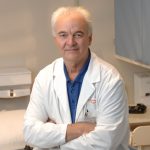
Pat Croskerry M.D., PhD, FRCP(Edin)
Pat Croskerry M.D., PhD, FRCP(Edin) is Professor in Emergency Medicine at Dalhousie University, Halifax, Nova Scotia, Canada. In addition to his medical training, he holds a doctorate in Experimental Psychology and Fellowship in Clinical Psychology.
His research is principally concerned with clinical decision-making, especially the processes that lead to diagnostic failure. He has published over 100 journal articles and 45 book chapters in the areas of patient safety, clinical decision making, and medical education reform. Two of his papers are in the top 3 cited papers in the Emergency Medicine education literature. He was senior author on 2 books Patient Safety in Emergency Medicine (2009), and Diagnosis: Making Sense of the Shadows published (2017), and author of The Cognitive Autopsy: A Root Cause analysis of Medical Decision Making, published in 2020. He is lead author of the upcoming Critical Thinking in Clinical Medicine in the Oxford Handbook Professional Series to be published in 2026. He has given over 400 presentations at leading universities around the world.
He was appointed to the US Institute of Medicine Committee on Diagnostic Error in Medicine in 2014. In 2015-16 he was a member of an expert advisory panel for the NASA Cognition and Space Flight Project. He was nominated to the Canadian Association of Emergency Physicians Top Ten List of most impactful Canadian medical educators in 2016. He was Director of the Critical Thinking Program at Dalhousie Medical School from 2012 – 2022.
Contact information:
pgcxkerry@gmail.com
Sangeeta Ahluwalia - Implementing Diagnostic Excellence Across Systems: An Opportuinty to Improve Care

Sangeeta Ahluwalia
Sangeeta Ahluwalia is a senior policy researcher and associate director of RAND Health Care leads studies to improve access and quality of palliative care, as well as to enhance diagnostic safety across health care settings. She is currently co-leading an AHRQ-funded initiative to implement diagnostic safety resources across 150 healthcare organizations in the US, and a Moore Foundation effort to assess the costs of delayed diagnosis across conditions. She also conducts evidence synthesis research and is a core investigator for the Southern California Evidence Review Center. Dr. Ahluwalia received her PhD from UC Berkeley in 2007 in health policy.
Contact information:
sahluwal@rand.org
Shaila Jiwa & Anna Ryan - Embedding Patient and Family Partner Perspectives within Quality & Safety Initiatives

Shaila Jiwa
Shaila Jiwa is the Director for Quality, Patient Safety and Accreditation at the Provincial Health Services Authority (PHSA). A registered nurse by background, she holds a Masters of Science in Population and Public Health and has worked in various roles over the past 20 years including being a front line public health nurse, then taking progressively more leadership roles in education, professional practice and now within quality and safety. While working at the BC Centre for Disease control she received the Canadian College of Health Leader’s Celebrating the Human Spirit Award. Shaila is passionate about, and committed to, systems level change and improving the lives of populations and communities. And she continues to work to improve health systems, health outcomes and patient and family experience.
Contact information:
Shaila.Jiwa@phsa.ca

Anna Ryan
Anna Ryan is the Manager of the Central Quality, Patient Safety, and Accreditation team at the Provincial Health Services Authority (PHSA), which holds a province-wide mandate to deliver and coordinate specialized health services for all residents of British Columbia, Canada. She is grateful to live, work and create safer care systems on the unceded, ancestorial and traditional lands of the First Nations Peoples. Anna is a Registered Nurse and holds a Bachelor’s degree from the University of Western Ontario and a Master’s degree in Nursing from the University of British Columbia. In her current role, Anna leads a team that is advancing quality and safety priorities across all 5 program areas that make up PHSA, the BC Centre for Disease Control, BC Emergency Health Services, BC Cancer, Children and Women’s and BC Mental Health and Substance Use Services, in an aligned, equitable and meaningful way. This includes advancing and evaluating work within PHSA’s Integrated Quality and Safety Strategy. Anna brings a background working in public health at local, provincial and federal levels to her current role and is passionate about equitable, system-wide change to create safer and better care.
Contact information:
anna.ryan@phsa.ca
Siena Ruggeri - Building the Table Together: Lessons on Authentic Community Engagement from INSPIRE

Siena Ruggeri
Prounouns: she/her
Siena Ruggeri is a Community Engagement Consultant for the Center for Community Engagement in Health Innovation at Community Catalyst. In this role, she supports clients in meaningfully engaging with their communities, with the goal of improving health care services and the overall health of people with complex needs, particularly those from historically marginalized, excluded, or underrepresented communities.
In her role, she provides consulting services to a diversity of clients that serve older adults, people with disabilities, and people with complex health care needs. She delivers facilitation, training, and other services that assist clients with developing and implementing programs to better serve members/patients. Her work has focused on people dually enrolled in Medicare and Medicaid, older adults, family caregivers, and advancing opportunities to address social drivers of health and promote health equity.
Before joining Community Catalyst, Siena worked as a Government Relations Associate at NETWORK Lobby for Catholic Social Justice. Siena graduated from Regis University with a Bachelor of Arts in Politics and a minor in Peace & Justice Studies.
Contact information:
sruggeri@communitycatalyst.org
Tara Bannow - How patient care suffers when money comes first

Tara Bannow
Tara Bannow is a reporter covering the business of health care at STAT, a national health and medicine news outlet produced by The Boston Globe. Her beat covers hospitals, health insurance, doctors, medical billing, private equity, and lots of other odds and ends. She reported on how UnitedHealth Group uses vertical integration, especially its physician empire, to boost profits, for a George Polk Award-winning series called Health Care’s Colossus. Prior to STAT, she wrote for Modern Healthcare and newspapers in Oregon and Iowa.
Contact information:
tara.bannow@statnews.com

We are pleased to invite interested sponsors to support our 22nd Annual Conference. As a sponsor you are helping to subsidize the cost of the conference to healthcare staff and provide free attendance to patients, families, and students.
THIS YEAR’S PACKAGES OFFER SEVERAL LEVELS FROM WHICH TO CHOOSE.
Details of package benefits are described in the application.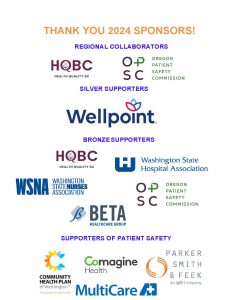
- Platinum Sponsor – $10,000 (1 available)
- Gold Sponsor(s) – $7,500 (3 available)
- Silver Sponsor(s) – $5,000
- Bronze Sponsor(s) – $2,500
- Supporter(s) of Patient Safety – $1,500
All sponsors will be recognized on the Washington Patient Safety Coalition website and marketing materials with sponsor logos linking to a webpage of your choice.
Platinum, Gold, Silver and Bronze sponsors have access to a dedicated page on the conference website which can include images, videos, links, etc.
Downloadable PDF version here: AGENDA
DAY 1 - Thursday, October 16, 2025 8:00 A.M. - 1:00 P.M. (PST)

DAY 2 - Friday, October 17, 2025 8:00 A.M. - 1:00 P.M. (PST)

WELCOME TO THE 2025 22ND ANNUAL NORTHWEST PATIENT SAFETY CONFERENCE!
On the day of the meeting, click on the button above to enter the event portal. To gain access, you will be required to enter your attendee confirmation code that you can find at the very bottom of your registration confirmation email OR by clicking HERE to recover your code. If you have any trouble getting in, please contact Amelina Kassa at 206-204-7384.
